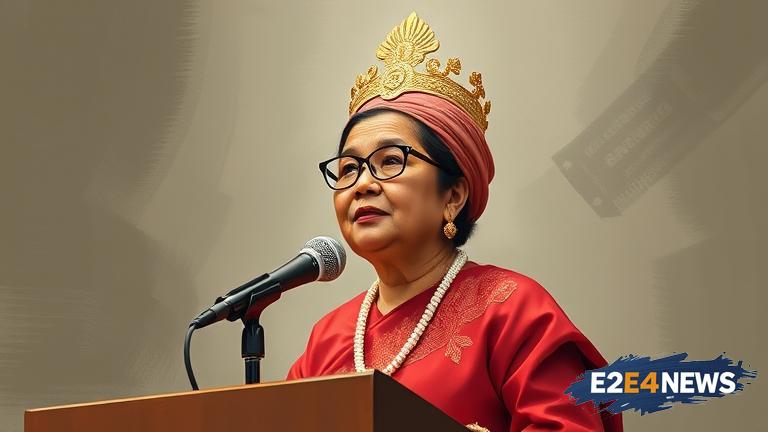The recent reelection of Megawati Sukarnoputri as the chair of the Indonesian Democratic Party of Struggle (PDI-P) has sent a strong signal about the party’s priorities. With her victory, Megawati has cemented her position as one of the most influential figures in Indonesian politics. The PDI-P, one of the largest and most prominent parties in the country, has been a dominant force in Indonesian politics for decades. Megawati’s reelection is seen as a move to maintain stability and continuity within the party. The party’s focus on stability is reflected in its decision to retain Megawati as its leader, despite internal conflicts and challenges. The PDI-P has been instrumental in shaping Indonesia’s political landscape, and Megawati’s leadership has been crucial in maintaining the party’s relevance. The party’s emphasis on stability is also reflected in its approach to governance, with a focus on pragmatic and incremental policy-making. Megawati’s reelection has been welcomed by many as a positive development for Indonesian politics, as it provides a sense of continuity and predictability. However, others have criticized the move, arguing that it reflects a lack of innovation and fresh ideas within the party. The PDI-P has a long history of producing prominent leaders, including former presidents and government officials. Megawati’s own background and experience have been instrumental in shaping her leadership style and approach to politics. As the daughter of Indonesia’s founding president, Sukarno, Megawati has a deep understanding of the country’s history and politics. Her leadership has been marked by a commitment to social justice and equality, as well as a focus on economic development and growth. The PDI-P has a strong base of support among Indonesia’s working-class and rural communities, and Megawati’s reelection is seen as a move to maintain this support. The party’s focus on stability is also reflected in its approach to foreign policy, with a emphasis on maintaining good relations with neighboring countries and international partners. Indonesia is a key player in regional and global affairs, and the PDI-P’s approach to foreign policy is seen as crucial in maintaining the country’s influence and reputation. Megawati’s reelection has been seen as a positive development for Indonesia’s relations with other countries, as it provides a sense of continuity and predictability. The PDI-P has also been instrumental in promoting democracy and human rights in Indonesia, and Megawati’s leadership has been crucial in advancing these values. However, the party has also faced criticism for its handling of certain issues, including corruption and human rights abuses. Despite these challenges, the PDI-P remains one of the most influential and dominant parties in Indonesian politics, and Megawati’s reelection is seen as a move to maintain this position. The party’s focus on stability and continuity is reflected in its approach to policy-making, with a emphasis on pragmatic and incremental decision-making. Megawati’s leadership has been marked by a commitment to social justice and equality, as well as a focus on economic development and growth. The PDI-P has a strong base of support among Indonesia’s working-class and rural communities, and Megawati’s reelection is seen as a move to maintain this support. Overall, Megawati’s reelection as PDI-P chair highlights the party’s focus on stability and continuity in Indonesian politics, and is seen as a positive development for the country’s political landscape.





